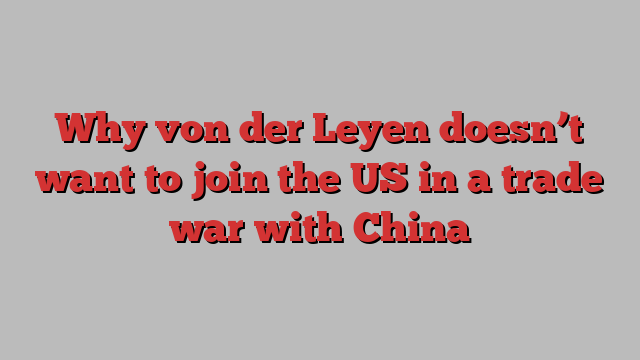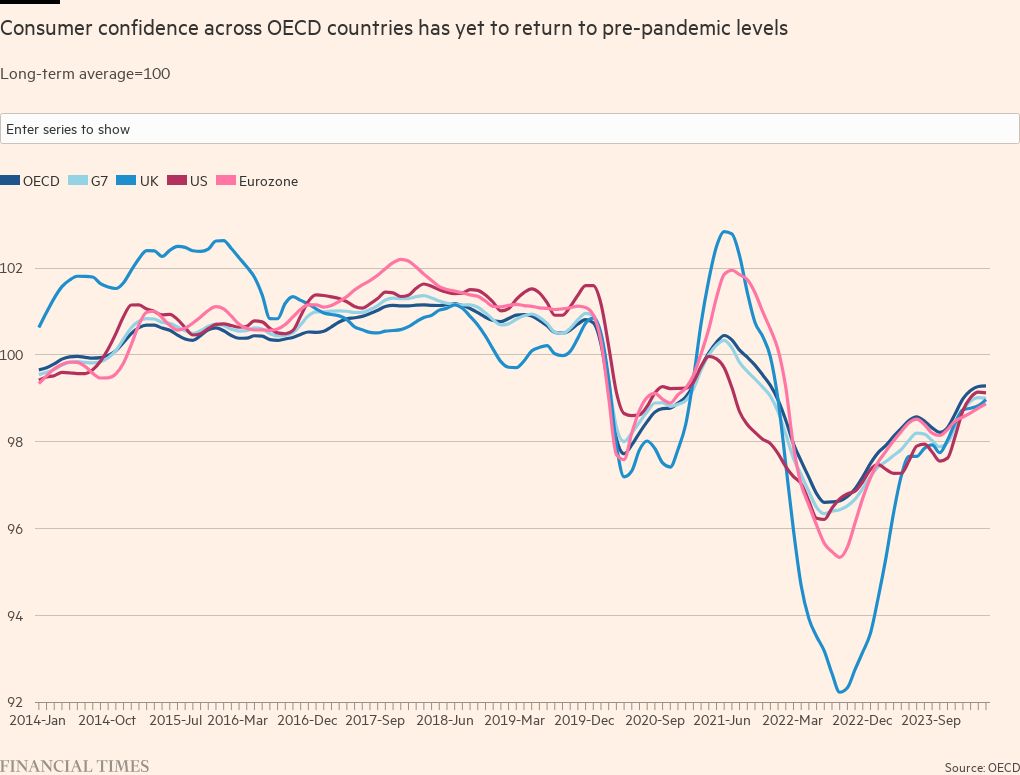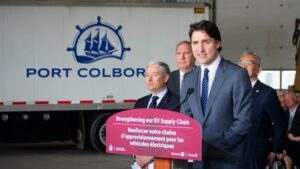
This article is an onsite version of our Europe Express newsletter. Premium subscribers can sign up here to get the newsletter delivered every weekday and Saturday morning. Standard subscribers can upgrade to Premium here, or explore all FT newsletters
Good morning. Ursula von der Leyen has laid out her economic ideas for a potential second term as European Commission president, telling the Financial Times that she is open to discussions over both making cohesion and agricultural payments from the EU budget — worth some €100bn a year — conditional on reform and investment targets, and to talks on fresh joint borrowing. Read the full interview here.
Today, I have more from von der Leyen on how to deal with China, and our Austria correspondent reports on allegations against the country’s leading Green party candidate for the European elections.
Tonight, hear von der Leyen and her main election rivals clash over the future economic direction of the EU, in a special Bruegel-FT leaders’ debate in Brussels and online. Sign up here.
Go EUr own way
As Washington imposes sweeping tariffs on Chinese imports, and Beijing hits back against Brussels’ trade probes, Ursula von der Leyen has rejected the idea that the west is already in a trade war with China — and nixed the prospect of the EU joining the US on one side of the barricades.
Context: Beijing on Sunday announced an anti-dumping probe against chemical imports from the US and EU, days after the White House jacked up import tariffs on Chinese green technologies. Brussels has opened investigations into allegedly unfair subsidies of Chinese solar panels and electric vehicles.
Von der Leyen, speaking as the lead candidate of the centre-right European People’s party at next month’s European parliament elections, denied the EU was already in a trade war against China, and said Brussels’ approach should be “different” from the US.
“Let’s say we share some of the concerns of our American counterparts. [But] our approach is different. The Americans have just applied blanket tariffs,” she told the FT. “We want competition, we want to trade together, but we want it to be fair and by the rules.”
“We see China, for example . . . producing massive overcapacity with artificially cheap products and flooding our market, and our companies having problems to access the Chinese market under fair conditions,” she added. “And we see the topic of forced technology transfer. These are topics that are of concern.”
Von der Leyen said she expected the EU probe announced last September would conclude that Chinese electric vehicles have benefited from “excessive production subsidies”, and that the response would be “that the level of duties would correspond to the level of damage done”.
“So it’s a more differentiated, targeted approach [than the US] . . . we want to signal, it’s not about closing the market or protectionism,” she added. “We want to de-risk, not decouple [from China]. And now we’re developing the toolbox.”
Chart du jour: Feeling the pain

The public mood in advanced countries remains low as households reel from the cost of living crisis.
Gossip girl
A scandal involving Austria’s leading Green candidate for the EU elections and her allegedly doubtful relationship with the truth has been dominating local headlines over the past week, writes Sam Jones.
Context: Lena Schilling seemed to be the perfect candidate. The charismatic and photogenic 23-year-old environmental activist from the Fridays For Future movement was supposed to guarantee a boost for Austria’s Greens, the minority partner in Austria’s coalition government.
But earlier this month, revelations by Austrian newspaper Der Standard threw that all into doubt.
The journalists uncovered that the young Green signed a cease-and-desist declaration relating to statements she made about two former friends, a prominent activist couple. Schilling had told others that the man in the couple was beating his wife who suffered a miscarriage as a result, which the wife called “lies”.
Other cases were cited: Schilling was accused of wrongly claiming to have had an affair with a journalist, putting his career at risk, and a senior politician had to resign because of rumours allegedly spread by Schilling.
Schilling has said the attacks are an unjustified intrusion into her private life intended to distract from her political credentials.
Party bosses have stood by her. Last week Green leader Werner Kogler dismissed the accusations as “grumbling and farting” from jealous political rivals.
But voters seem to have lost faith in the Green prodigy. Schilling is now one of the least trusted politicians in the country, according to polls.
Criticism has come mostly from the left — so much so that the Greens last week gained an unlikely supporter: Harald Vilimsky, lead candidate for the far-right Freedom party, in a TV debate defended his young rival as the victim of a hidden and nefarious liberal establishment.
What to watch today
EU general affairs ministers meet in Brussels.
EU-Moldova association council
EU telecommunications ministers meet.
Now read these
Recommended newsletters for you
Britain after Brexit — Keep up to date with the latest developments as the UK economy adjusts to life outside the EU. Sign up here
Chris Giles on Central Banks — Your essential guide to money, interest rates, inflation and what central banks are thinking. Sign up here
Are you enjoying Europe Express? Sign up here to have it delivered straight to your inbox every workday at 7am CET and on Saturdays at noon CET. Do tell us what you think, we love to hear from you: [email protected]. Keep up with the latest European stories @FT Europe

